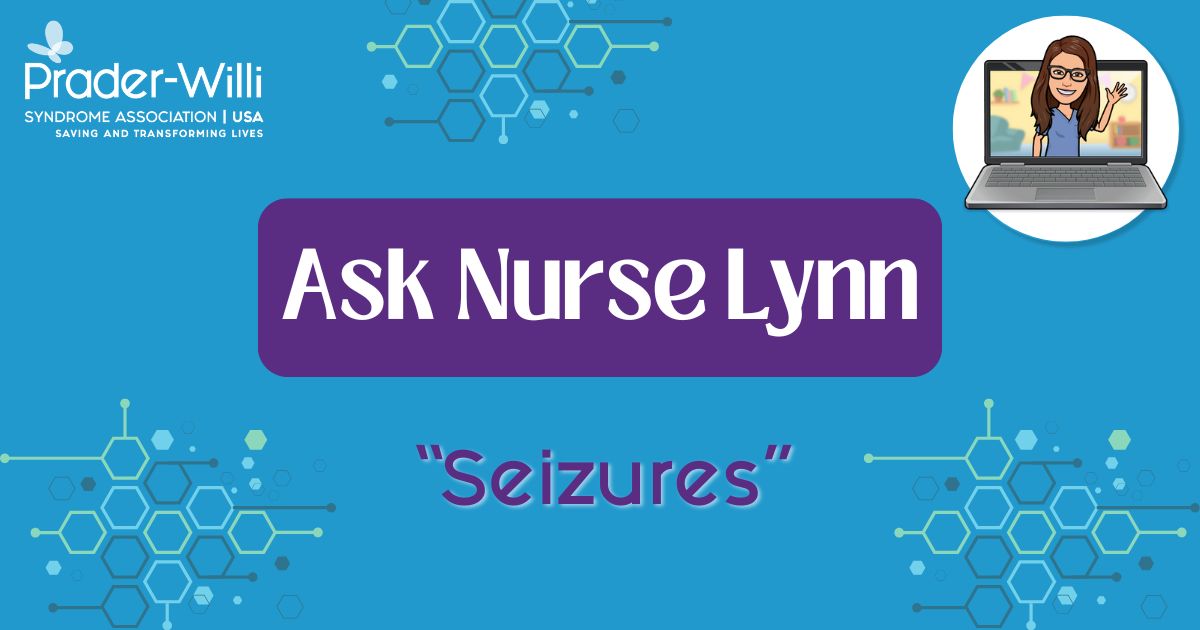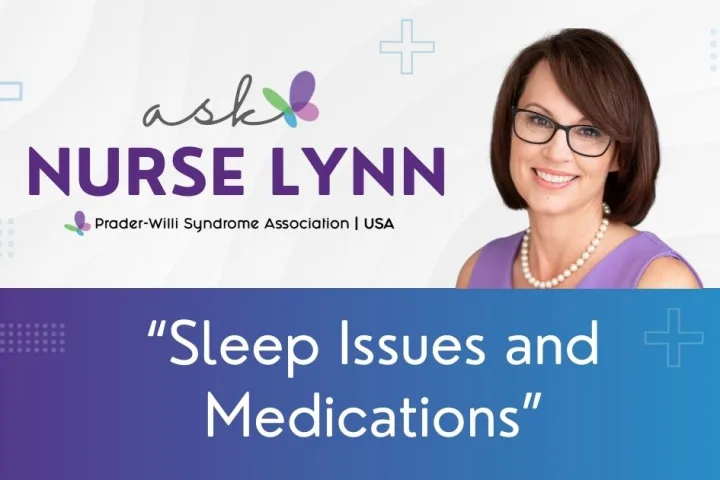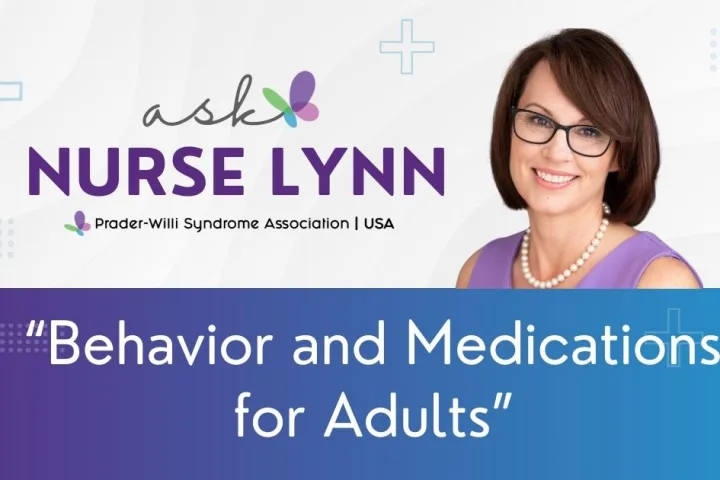Question:
Female, 40 years old, Deletion subtype
My daughter had 2 seizures 15 years ago. The doctor wants to now take her off all preventive meds. How do we know if the meds are preventing seizures? She is scheduled for a 3-day EEG next week and has reduced her meds by 50%. We have lost 6 friends from seizures and would appreciate any advice or doctor recommendations. Thanks, Worried Mother
Nurse Lynn’s Response:
It’s completely understandable to feel concerned about your daughter’s situation, especially given the history of seizures and the seriousness of epilepsy-related risks.
Preventive anti-seizure medications work by reducing the likelihood of seizures, but it can be challenging to determine if the absence of seizures over 15 years is due to the medications or if her condition has improved.
The 3-day EEG is critical. It will help detect abnormal brain activity even if no seizures occur during the monitoring period. This will provide the doctor with valuable insights into whether your daughter remains at risk without the medication.
People with PWS can have an increased risk of seizures, often related to low muscle tone, sleep apnea, or other neurological factors. These risks should be carefully assessed when considering changes to medication.
A slow and monitored taper is advised. Keep an eye on any changes in behavior, alertness, or unusual symptoms, which could signal potential seizure activity.
I think it is appropriate to share your fears about seizures and the loss of friends with your daughter’s neurologist. If the doctor is aware of your concerns, they may adjust the tapering plan or recommend additional monitoring, such as at-home seizure detection devices or an extended observation period.
Here are some possible questions to ask:
- 1. Are there alternatives to a full discontinuation of medications, such as reducing to a very low dose?
- 2. What is the risk of seizure recurrence given her specific history and PWS?
- 3. Are there any genetic or metabolic tests that could further clarify her seizure risk?
- 4. Should she undergo a sleep study to evaluate for sleep apnea, as this can contribute to seizures in individuals with PWS?
It’s great that your daughter has an EEG planned. That, combined with your careful monitoring and open communication with her care team, will help guide the safest path forward.
Do you have a question for Nurse Lynn? Submit your question here:
Share this!





 Perry A. Zirkel has written more than 1,500 publications on various aspects of school law, with an emphasis on legal issues in special education. He writes a regular column for NAESP’s Principal magazine and NASP’s Communiqué newsletter, and he did so previously for Phi Delta Kappan and Teaching Exceptional Children.
Perry A. Zirkel has written more than 1,500 publications on various aspects of school law, with an emphasis on legal issues in special education. He writes a regular column for NAESP’s Principal magazine and NASP’s Communiqué newsletter, and he did so previously for Phi Delta Kappan and Teaching Exceptional Children. Jennifer Bolander has been serving as a Special Education Specialist for PWSA (USA) since October of 2015. She is a graduate of John Carroll University and lives in Ohio with her husband Brad and daughters Kate (17), and Sophia (13) who was born with PWS.
Jennifer Bolander has been serving as a Special Education Specialist for PWSA (USA) since October of 2015. She is a graduate of John Carroll University and lives in Ohio with her husband Brad and daughters Kate (17), and Sophia (13) who was born with PWS. Dr. Amy McTighe is the PWS Program Manager and Inpatient Teacher at the Center for Prader-Willi Syndrome at the Children’s Institute of Pittsburgh. She graduated from Duquesne University receiving her Bachelor’s and Master’s degree in Education with a focus on elementary education, special education, and language arts.
Dr. Amy McTighe is the PWS Program Manager and Inpatient Teacher at the Center for Prader-Willi Syndrome at the Children’s Institute of Pittsburgh. She graduated from Duquesne University receiving her Bachelor’s and Master’s degree in Education with a focus on elementary education, special education, and language arts. Evan has worked with the Prader-Willi Syndrome Association (USA) since 2007 primarily as a Crisis Intervention and Family Support Counselor. Evans works with parents and schools to foster strong collaborative relationships and appropriate educational environments for students with PWS.
Evan has worked with the Prader-Willi Syndrome Association (USA) since 2007 primarily as a Crisis Intervention and Family Support Counselor. Evans works with parents and schools to foster strong collaborative relationships and appropriate educational environments for students with PWS. Staci Zimmerman works for Prader-Willi Syndrome Association of Colorado as an Individualized Education Program (IEP) consultant. Staci collaborates with the PWS multi-disciplinary clinic at the Children’s Hospital in Denver supporting families and school districts around the United States with their child’s Individual Educational Plan.
Staci Zimmerman works for Prader-Willi Syndrome Association of Colorado as an Individualized Education Program (IEP) consultant. Staci collaborates with the PWS multi-disciplinary clinic at the Children’s Hospital in Denver supporting families and school districts around the United States with their child’s Individual Educational Plan. Founded in 2001, SDLC is a non-profit legal services organization dedicated to protecting and advancing the legal rights of people with disabilities throughout the South. It partners with the Southern Poverty Law Center, Protection and Advocacy (P&A) programs, Legal Services Corporations (LSC) and disability organizations on major, systemic disability rights issues involving the Individuals with Disabilities Education Act (IDEA), Americans with Disabilities Act (ADA), and the federal Medicaid Act. Recently in November 2014, Jim retired.
Founded in 2001, SDLC is a non-profit legal services organization dedicated to protecting and advancing the legal rights of people with disabilities throughout the South. It partners with the Southern Poverty Law Center, Protection and Advocacy (P&A) programs, Legal Services Corporations (LSC) and disability organizations on major, systemic disability rights issues involving the Individuals with Disabilities Education Act (IDEA), Americans with Disabilities Act (ADA), and the federal Medicaid Act. Recently in November 2014, Jim retired.